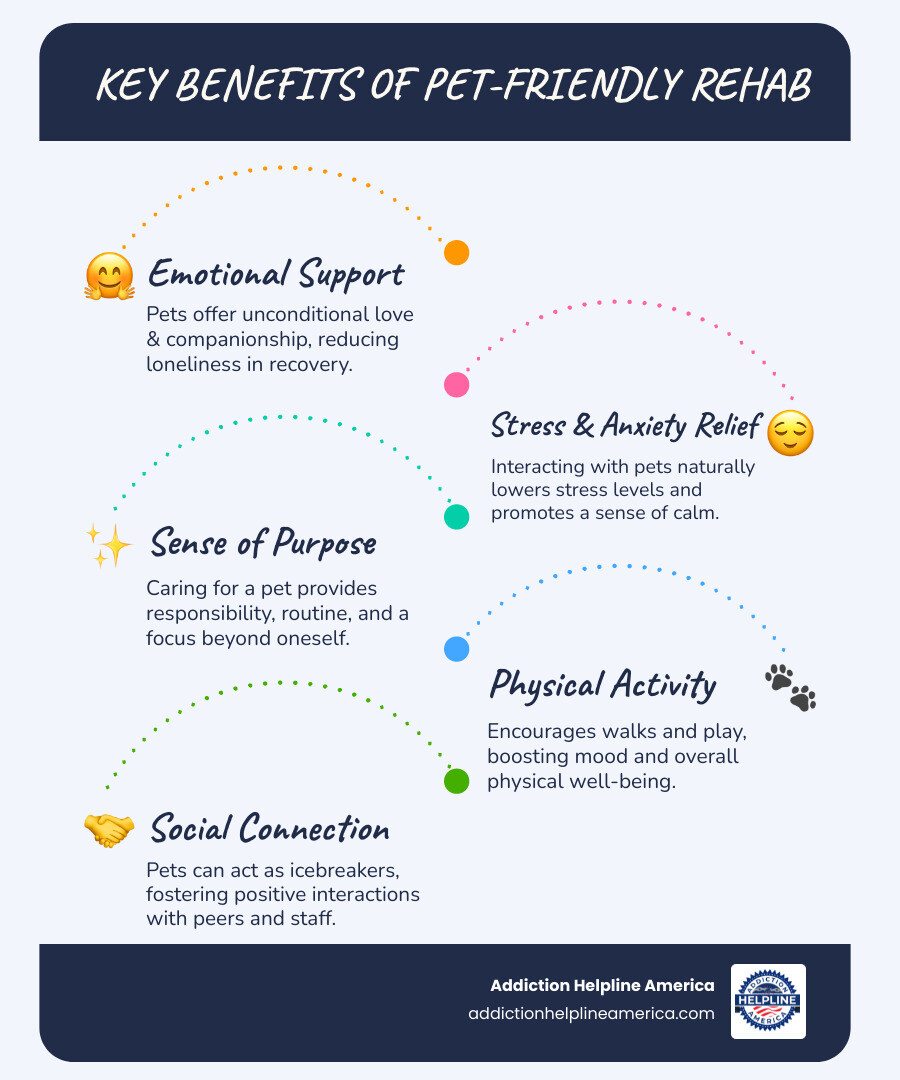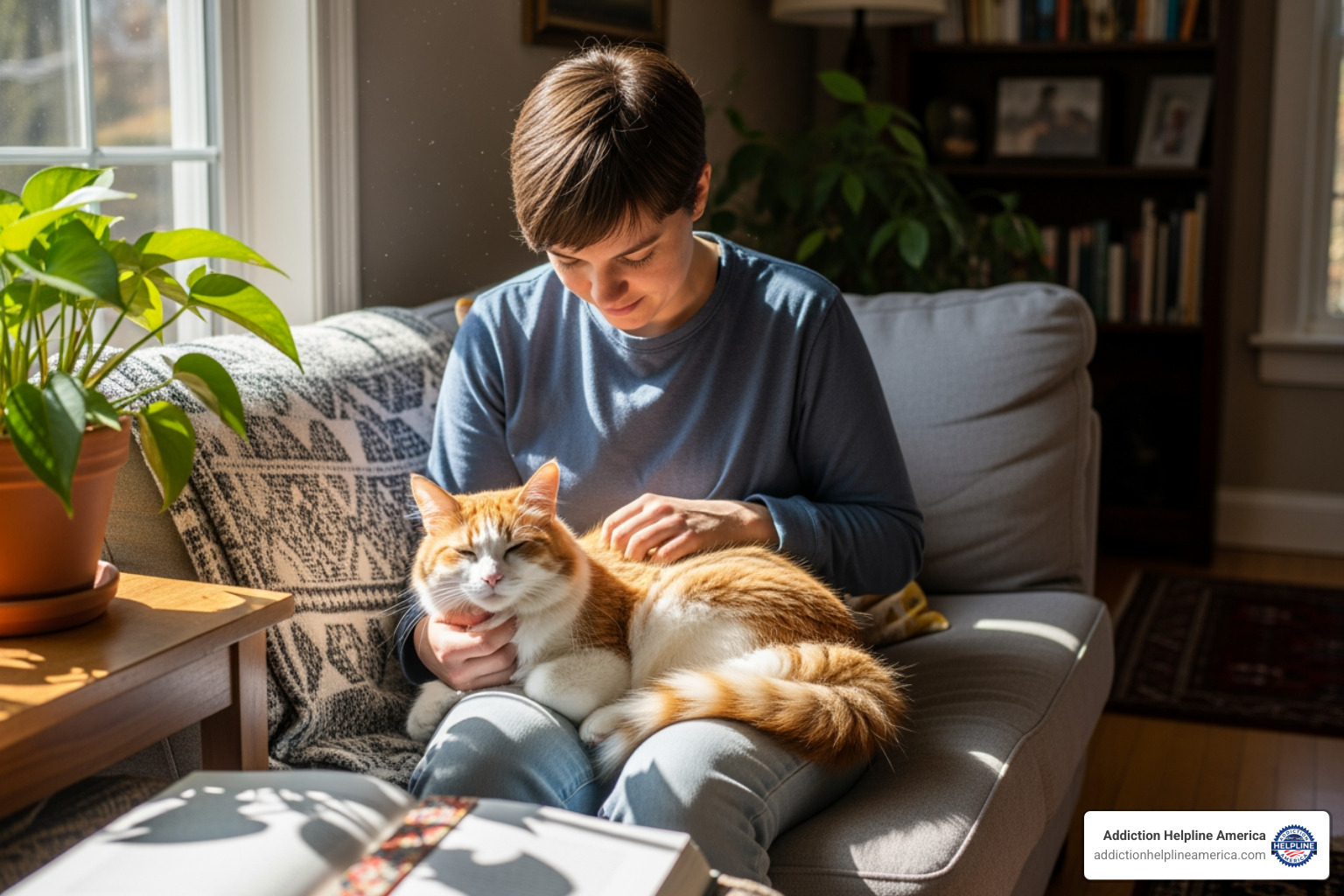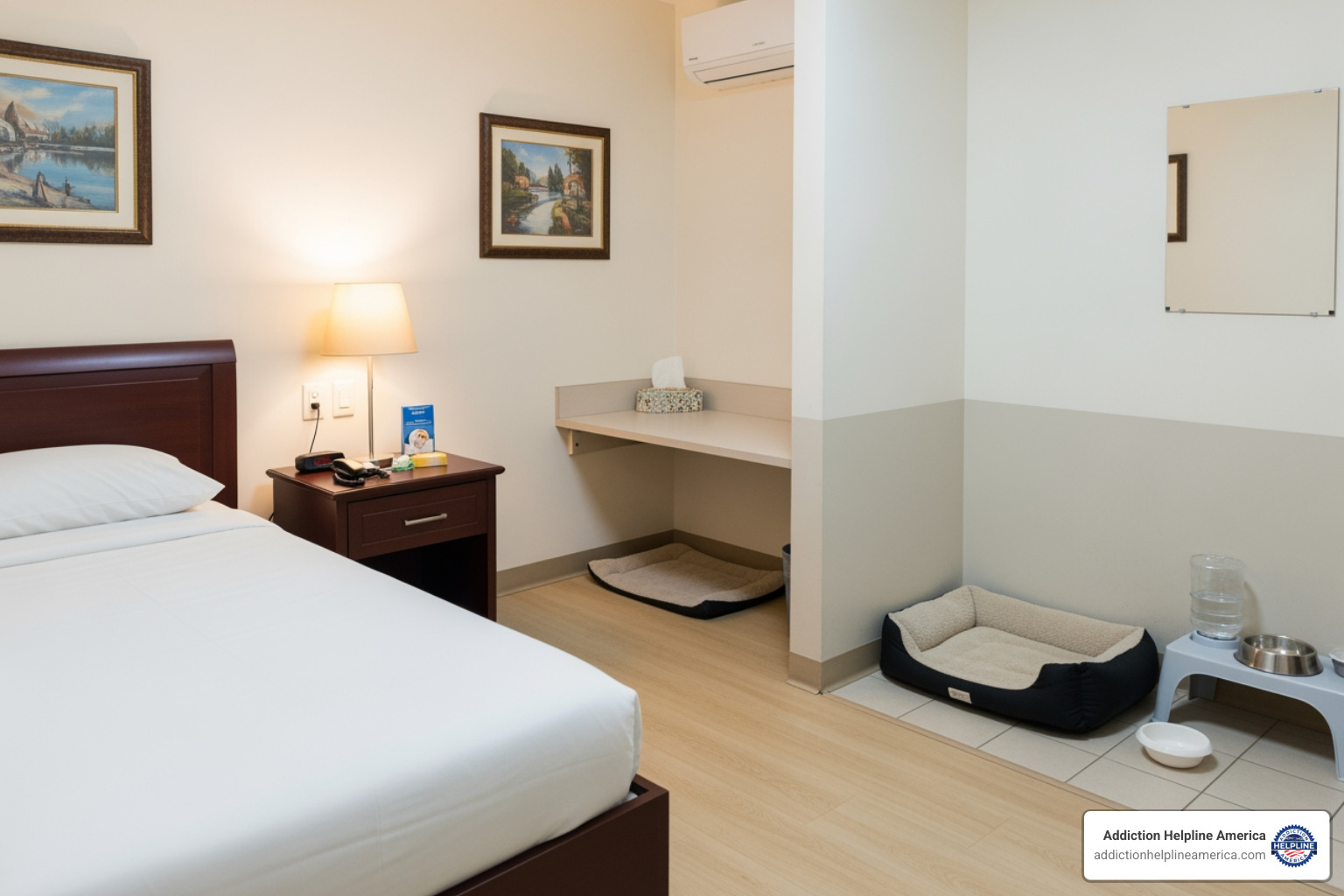
Why Finding Pet Friendly Drug Rehab California Matters for Your Recovery Journey
Pet friendly drug rehab california programs allow you to bring your beloved companion with you during addiction treatment. Here’s what you need to know:
Quick Facts:
- What it is: Rehabilitation facilities that accept pets (usually dogs and cats) on a case-by-case basis
- Typical requirements: Updated vaccination records, pet supplies, leash, and owner responsibility for care
- Key benefits: Emotional support, reduced anxiety, sense of purpose, and increased likelihood of completing treatment
- Additional costs: Some facilities charge a pet deposit or additional fee
- Service animals: Generally welcomed under ADA guidelines; ESAs require proper documentation
Finding Options:
- Use online rehab directories with pet-friendly filters
- Call facilities directly to ask about their specific pet policies
- Contact addiction helplines for personalized guidance
- Verify insurance coverage and any pet-related fees upfront
Are you willing to seek treatment but can’t imagine leaving your pet behind? You’re not alone. For many struggling with addiction, separating from a pet for a 30-day program feels impossible, especially when that animal is their only source of comfort and love.
The good news is that more California rehab centers now recognize your pet is part of your recovery team. In one study from the Human Animal Bond Research Institute, 74% of people reported mental health improvements from pet ownership. That bond is a powerful tool during the challenging early days of sobriety.
At Addiction Helpline America, we’ve connected thousands of individuals with treatment options that accommodate their unique needs, including pet friendly drug rehab california facilities. Our experienced team knows that finding a program where your pet can stay by your side can make the difference between seeking help now or delaying it.
Essential pet friendly drug rehab california terms:
Why Your Pet’s Presence is a Powerful Tool for Sobriety
When you’re facing addiction recovery, your pet isn’t just along for the ride—they’re one of your greatest allies. The comfort a pet provides after a bad day becomes even more valuable when you’re working through the challenges of getting sober.
Emotional support is where pets truly shine. Recovery can feel isolating. You’re in a new place, confronting emotions you may have numbed for years, and building a life without substances. It’s a lot to handle alone.
Your pet doesn’t care about your past mistakes. They offer unconditional love—no judgment, just pure acceptance. This steady companionship can significantly reduce the loneliness that often makes early recovery so hard. Petting your cat or walking your dog provides constant comfort that helps you feel more secure and grounded.
The mental health benefits go beyond just feeling less lonely. Spending time with animals actually changes your body chemistry in positive ways. When you pet your dog or play with your cat, your stress hormone (cortisol) drops while your bonding hormone (oxytocin) increases. The result? You feel calmer and less anxious.
Research backs this up. The Human Animal Bond Research Institute found that 74% of people reported mental health improvements from pet ownership. This applies in recovery settings, too. When you’re dealing with anxiety, cravings, or the emotional ups and downs of early sobriety, having your pet nearby can provide natural stress reduction.
Pets give you a sense of purpose at a time when you might feel lost. Addiction often makes life revolve around substance use. Recovery means rebuilding structure, and caring for your pet is a great way to start that process.
Your furry friend needs you to be fed, walked, and loved. This daily routine and responsibility helps shift your focus outward, away from self-centered thinking and toward the needs of another. It’s gentle accountability—a reminder that you matter to a creature you love.
There are physical benefits too. Dogs especially encourage you to get moving. Walking your dog or playing in a designated area provides exercise, a powerful natural mood booster. Physical activity releases endorphins, which help counteract the artificial highs sought through substances. You’re replacing harmful coping mechanisms with healthy ones, one walk at a time.
Don’t underestimate the social benefits either. Pets are incredible icebreakers. It’s easier to start a conversation with a fellow patient when you’re both watching your dogs play. These casual interactions can reduce social anxiety and help you build connections with peers going through similar struggles.
This community is vital. Recovery isn’t just about stopping substance use—it’s about building a new life with meaningful relationships. Your pet can be the bridge that helps you connect with others, making it easier to form the support network you’ll need for long-term sobriety.
The bottom line: your pet is a therapeutic presence that supports your recovery by reducing stress, providing structure, encouraging exercise, and fostering social connections. The human-animal bond offers real, measurable benefits during one of the most challenging journeys you’ll ever take.
Understanding Pet-Friendly Drug Rehab California Programs
So what exactly is a pet friendly drug rehab california program? Simply put, it’s an addiction treatment center that welcomes your furry companion alongside you. Instead of forcing you to choose between getting help and abandoning your pet, these facilities understand that your bond with your animal is a strong, healthy relationship that shouldn’t stand in the way of your healing.
Here’s something important to know: most facilities evaluate pets on a case-by-case basis. This means they’ll consider your pet’s size, breed, temperament, and behavior, along with their current capacity and the needs of other residents. This is good news if you’re worried your pet might not fit a strict policy.
Before you pack up Fluffy’s favorite toys, you’ll need to gather some paperwork. Every pet friendly drug rehab california center will require updated vaccination records and proof of good health from your veterinarian. This ensures all animals on-site are healthy and safe. Your pet should also be well-socialized—comfortable around new people and, ideally, other animals.
You’ll be your pet’s primary caregiver during treatment. That means you’re responsible for feeding, walking, playing, and cleaning up after them. This becomes part of your recovery routine. You’ll need to bring all the essentials: food, bowls, bedding, toys, a leash, and any medications. Most facilities require pets to be leashed in common areas for safety.
Now, let’s talk money. Some centers charge a pet deposit—often refundable if there’s no damage. Others may have additional fees to cover extra cleaning. These pet-related costs typically aren’t covered by health insurance, so it’s important to ask about them upfront to avoid surprises. At Addiction Helpline America, our team can help you steer these questions when we connect you with potential facilities.
There’s also an important distinction to understand: the difference between pet-friendly policies and formal Animal-Assisted Therapy (AAT). A pet-friendly rehab simply allows you to bring your own companion for comfort. AAT, on the other hand, is a structured therapy where trained therapists and animals work toward specific goals, like improving emotional regulation or reducing anxiety.
Both approaches have value, but they’re not the same. If you’re interested in AAT, ask whether the facility offers certified programs with trained therapists and therapy animals, or if they simply welcome your personal pet.
Service Animals and Emotional Support Animals (ESAs) in Rehab
The rules are a bit different when it comes to Service Animals and Emotional Support Animals (ESAs)—and understanding the distinction can help you advocate for your needs.
Service Animals are working animals, typically dogs, trained to perform tasks for someone with a disability. For example, a service dog might alert you to panic attacks or provide guidance for vision impairment. Under the Americans with Disabilities Act (ADA), service animals are legally protected and must be accommodated in virtually all public spaces, including rehab facilities. Legitimate service animals must generally be welcomed, though reasonable behavior and care policies still apply.
Emotional Support Animals (ESAs) provide vital comfort but are not trained to perform specific tasks, so they are not considered service animals under the ADA. However, the Fair Housing Act recognizes ESAs as assistance animals, which means that with proper documentation, many pet restrictions—like breed limits, deposits, or fees—can often be waived.
To have your pet recognized as an ESA, you’ll need documentation from a licensed mental health professional stating your animal provides necessary emotional support for a diagnosed condition. This requires a legitimate prescription from a provider who knows your case, not a quick online form. Make sure you have this paperwork ready and discuss it with the admissions team before arrival.
Types of Pets Typically Allowed
When most pet friendly drug rehab california centers say “pet-friendly,” they’re primarily talking about dogs and cats. These are the most common companion animals and the ones facilities are best equipped to accommodate.
That said, policies vary widely. Many centers have size restrictions—often a weight limit around 60 pounds—and some have breed restrictions, particularly for breeds perceived as aggressive. These policies are often due to insurance requirements or the comfort of other residents, not your pet’s individual temperament.
If your pet isn’t a dog or cat—or if your pet falls outside the typical guidelines—don’t give up hope. Some facilities may make exceptions depending on the animal’s needs and your ability to care for it. The key is to inquire early and be upfront. Call the admissions team, explain your pet’s specifics, and ask if they can accommodate you. The worst they can say is no, saving you time.
At Addiction Helpline America, we’re here to help you steer these conversations and find a facility that works for both you and your companion. You can reach our confidential helpline to discuss your unique situation and get personalized guidance.
How to Find and Choose a Pet-Friendly Rehab in California
Searching for a pet friendly drug rehab california center can feel overwhelming, but you don’t have to do it alone. The right resources can make all the difference in finding a facility that welcomes both you and your furry companion.
Online directories are a great place to begin. Many reputable rehab search platforms now include filters for amenities like “pet-friendly.” These tools help narrow your search in California, but listings are just a starting point.
Because pet policies vary and are often decided on a case-by-case basis, your next step should be picking up the phone. Speaking directly with admissions lets you ask detailed questions about rules, requirements, and costs for your pet. This conversation also gives you a feel for the facility’s flexibility.
If you’d prefer personalized guidance, Addiction Helpline America’s confidential helpline can connect you with treatment options custom to your situation. Our team understands your pet is part of your support system. We’ll help you identify pet friendly drug rehab california facilities that align with your needs and can even assist with verifying insurance coverage so there are no surprises.
Key Questions for a Pet Friendly Drug Rehab California Facility
When you reach out to a potential pet friendly drug rehab california center, come prepared with questions. This is about understanding what life will be like for you and your pet during treatment.
Start with the basics: What specific types of pets are allowed? Most facilities welcome dogs and cats, but size and breed restrictions are common. If you have a larger dog or a restricted breed, ask upfront to avoid disappointment.
Next, dig into the facility’s rules regarding pets. Will your pet need to stay on a leash in common areas? Are there designated outdoor spaces for exercise? What about noise considerations if your pet is vocal?
Understanding pet-friendly rooms and common areas is crucial. Some centers allow pets in your room, while others may have designated living spaces. Find out if your pet can join you in common areas or if they must stay in your room during group activities. Ask what happens during therapy sessions and if supervision is available or if you need to arrange alternative care.
Don’t forget the practical details: What documentation is required? Expect to provide vaccination records and possibly a health certificate. Some may conduct a temperament assessment to ensure your pet will be comfortable.
Be direct about additional costs or deposits. Some centers charge a refundable pet deposit, while others have ongoing fees. Understanding these expenses upfront helps you plan accordingly.
Finally, verify the facility’s credentials. Look for accreditation from The Joint Commission or CARF, and confirm they hold proper state licensing. These markers indicate a commitment to quality care and safety.
Vetting a Pet Friendly Drug Rehab California Center
Once you’ve identified a few promising pet friendly drug rehab california options, evaluate the quality of treatment they offer. While your pet is important, the clinical program is key to your recovery.
Start by understanding the levels of care offered. If you’re struggling with severe withdrawal, you’ll need a facility that provides Medical Detox to keep you safe. From there, Inpatient Residential treatment offers 24/7 support in a structured environment. As you progress, Outpatient Programs like Partial Hospitalization (PHP) or Intensive Outpatient (IOP) allow more independence while you still receive comprehensive care.
The treatment modalities used are as important as the accommodations. Cognitive Behavioral Therapy (CBT) helps change negative thought patterns that fuel addiction. Dialectical Behavior Therapy (DBT) teaches crucial emotional regulation skills for early sobriety. Many quality centers also offer holistic therapy like yoga, meditation, or art therapy to treat the whole person.
Don’t hesitate to ask about staff qualifications. What credentials do the therapists hold? How experienced are the medical professionals? If Animal-Assisted Therapy is offered, ask about the therapists’ certification and training.
Choosing the right rehab is one of the most important decisions you’ll make. For more detailed information about different treatment options and therapeutic approaches, visit our page on treatment programs.
You deserve a facility that offers both excellent clinical care and the comfort of your companion’s presence. Taking the time to ask these questions now can make all the difference in your recovery journey.
Frequently Asked Questions About Bringing a Pet to Rehab
Making the decision to enter treatment is hard enough without worrying about your pet’s care. We’ve heard these questions many times and want you to feel confident about how your furry friend will be cared for while you focus on healing.
What if my pet needs veterinary care during my stay?
Responsible pet friendly drug rehab california centers understand that pet emergencies happen and have plans in place. Many partner with local veterinarians or animal hospitals, so staff can arrange for your pet to get care safely and promptly. They can typically help arrange transportation and appointments if needed.
Here’s the important part: you’ll generally be responsible for the costs of any veterinary care your pet receives. These bills aren’t included in your treatment fees, so it’s wise to have a financial plan for them, whether that’s setting aside funds or having a family member who can help. Talk to the facility before you arrive so there are no surprises.
Can I bring more than one pet?
If you have multiple pets, you might wonder if they can all come. The short answer is: it depends.
Every facility has different capacity limits and handles multiple-pet situations on a case-by-case basis. Some centers might say yes, especially for two small, well-behaved pets. Others might have space constraints that make it challenging. Your pets’ size, type, and the number of other animals at the facility all factor in.
What matters most is that the facility knows you can realistically provide care for multiple pets while also focusing on the demanding work of recovery. You’ll be busy with therapy and group meetings. Caring for two or more pets requires honest self-assessment.
The best approach is to call the admissions team early and have a candid conversation about your situation.
What happens if my pet doesn’t get along with others?
Not all pets are social. If your pet is anxious or territorial, it’s right to wonder how this will work.
Reputable facilities often conduct a behavioral assessment before you arrive. This helps staff understand your pet’s temperament to create a safe environment for everyone. Many pet friendly drug rehab california centers have staff trained in animal behavior who can read warning signs and prevent problems.
Facilities typically have designated spaces where pets can have quiet time away from others, like a separate outdoor area or a private corner. The goal is to ensure everyone—human and animal—feels safe and comfortable.
In the rare case a pet can’t adjust and becomes disruptive, the facility will work with you to find alternative arrangements. This might mean a trusted family member stepping in or connecting you with local boarding options. No one wants this to happen, but it’s good to know there’s a backup plan.
The key is open communication. If you have concerns about your pet’s social skills, share them with the admissions team. They’re there to help you both succeed.
Take the First Step Towards Recovery with Your Companion
If you’re reading this, you’ve already taken an important step—you’re considering treatment. If the thought of leaving your pet behind has held you back, know that it doesn’t have to be a barrier to treatment.
Pet friendly drug rehab california centers understand that your dog or cat isn’t just an animal. They’re family. They are a loyal companion and a calming presence. The benefits of having your pet as a recovery partner are real. By providing emotional support, reducing anxiety, and giving you a sense of purpose, your pet can be one of your strongest allies in healing.
We know that addiction is isolating. We also know that sometimes, your pet feels like the only one who truly understands you without judgment. That bond doesn’t have to break just because you’re ready to get help. In fact, it can become part of your strength.
At Addiction Helpline America, we’ve helped thousands of people find treatment that fits their unique needs. We offer free, confidential guidance to help you find a program where your pet can stay by your side, because everyone deserves a chance to heal. Our nationwide network includes facilities that welcome you and your pet, and our experienced care coordinators understand how important this is to you.
Don’t let worry about pet care delay your treatment any longer. Your journey to recovery can include the comfort and motivation your pet provides. Whether you have a loyal dog who needs daily walks or a calming cat who curls up beside you, there are options that honor the role your pet plays in your life.
You deserve a brighter, healthier future. Your pet deserves to be part of that story, walking alongside you as you heal.
Explore your treatment options today or call us to speak with a compassionate care coordinator who understands what you’re going through. We’ll help you find the right pet friendly drug rehab california program for both you and your companion. Because recovery isn’t one-size-fits-all, and neither is finding the right place to heal.
You don’t have to do this alone—and neither does your pet.
Our helpline is 100%
free & confidential
If you or someone you care about is struggling with drug or alcohol addiction, we can help you explore your recovery options. Don’t face this challenge alone—seek support from us.
Programs
Resources
Will my insurance
cover addiction
treatment?
We're ready to help
Find the best
drug or alcohol treatment
center
Are you or a loved one struggling with addiction? Call today to speak to a treatment expert.







